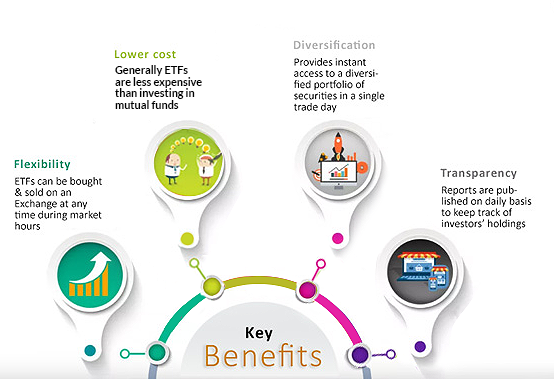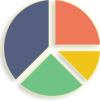
- Find a Brokerage Firm
- Find a Listed Company
- Contact Us
- Connect PSX
If you want to invest in equity/fixed income securities and find it difficult to select sectors, identify securities, conduct research, track dividends/coupons and capital gains, then the ETF does it all for you.
It aims to track the specified benchmark index, while providing real time price of the fund throughout the day.

An ETF, Exchange Traded Fund, is a type of fund that holds a basket of securities (e.g. stocks) that generally tracks an underlying Index. Because there are multiple scrips within an ETF, they can be a popular choice for investors seeking diversification.

Internationally, the demand for ETFs from retail investors has been increasing owing to the convenience and lack of financial acumen (or time) on part of the investors to make lucrative stock picks. Similarly, retail investors are also wary of paying hefty fees to financial advisors and traditional mutual funds which leads them to invest in ETFs.

An ETF can have tens of stocks across various industries or it could be isolated to one particular industry. For example, a banking-focused ETF would contain various stocks from the banking industry. An ETF can also track an existing index like the KSE – 30 index etc.

An ETF is a tradable security, that is it can be bought and sold on a stock exchange just like stocks. The price of ETF shares will change throughout the trading day as the shares are bought and sold on the market.

An Exchange-Traded fund (ETF) is a collective investment vehicle with shares that trade intraday on Stock Exchanges at a market-determined price. Buying or Selling ETF shares is accommodated through a Broker, just like the shares of any publicly traded company.
 Combine individual ETFs to build broadly diversified portfolios
Combine individual ETFs to build broadly diversified portfolios  Gain precise, consistent exposure to a specific market segment
Gain precise, consistent exposure to a specific market segment  Construct portfolio using ETFs as either core or satellite investment
Construct portfolio using ETFs as either core or satellite investment
Primarily index based, some are actively managed

Actively managed or index based
ETFs can be bought or sold at current market price throughout the day
It can be traded on the Exchange through a brokerage account
NAV is updated in real time throughout the market hours

Mutual funds can be purchased & redeemed at the end of the day NAV
It is not traded on the Exchange
NAV is updated at the end of the day
Underlying holdings are published every trading day

Holdings are generally disclosed monthly by AMCs
Generally have low management fees
Brokerage firm charges a commission

Usually have high management fees
Mutual funds may include sales fees
An Exchange Traded Fund (ETF) is an investment product (Collective Investment Scheme) offered by Asset Management Companies (AMC) consisting of a basket of securities that tracks an index (aka Benchmark Index). ETFs are available to investors on the Exchange through stockbrokers (TREC Holders) and trade like stocks with real time pricing during trading hours on an Exchange. Therefore, they share the characteristics of both open-ended mutual funds and stocks.
ETFs can potentially have two types of returns:
Capital Gains:
Investors can trade ETFs like a stock by buying it at a low price and selling it at a high price to realize the profit/gain.
Dividends:
The fund manager usually receives dividends from the securities that comprise the ETF basket. The dividends may be distributed to ETF unit holders after the deduction of management fee etc. Dividend distribution policy of the ETFs are described in their Prospectus or Offering Document.
A new investor needs to open a trading (brokerage) account with any of the PSX TREC Holders or brokerage firms.
An existing investor of stock market can buy and sell the ETF units through their existing trading (brokerage) account opened with any of the PSX TREC Holders.
The performance of an ETF is dependent on the performance of the underlying securities. ETFs, like all financial products, do experience some degree of risk. However, ETFs may face lower specific risk than a particular stock as it comprises of a basket of stocks.
An ETF is a type of fund that holds underlying assets based on which ETFs are issued. Underlying assets are kept with the Trustee of the Fund.
Dividend received by Exchange Traded Funds are tax exempted provided 90% of dividend income is distributed to unit holders, however the ETF holders will be subject to applicable Income Tax on dividend income distributed by the Fund. Refer to your Tax Advisor for further information.
Resident person other than a company shall be entitled to a tax credit under the Income Tax Ordinance, 2001, on purchase of new Units. Refer to your Tax Advisor for further information.
Capital gain arising from sale / disposal of ETFs in the secondary market will be subject to tax at the applicable tax rate as mentioned in Income Tax Ordinance 2001 and shall be computed, determined and collected by the National Clearing Company of Pakistan Limited (NCCPL). Refer to your Tax Advisor for further information.
The ETFs may generate income including dividends and capital gains. Distribution policy of the ETF are described in the Prospectus or Offering Document and can be inquired from the fund manager directly.
The dividends may be distributed from the dividends received against the securities of the underlying basket of securities after deduction of management fee etc. Dividend distribution policy of the ETF are described in the Prospectus or Offering Document.
Individual stocks and ETFs trade alongside each other on the Stock Exchange. But there are two major differences:
Better is a relative term; investing in ETFs is generally better from diversification perspective.
There are pros and cons of each. ETFs are generally passive instruments formed with the objective of tracking an index. ETFs provide real-time pricing, so one can see their prices change throughout the trading day. ETFs are bought and sold at market price through a brokerage account and offer intraday trading liquidity. Price of ETF can be above (premium) or below (discount) the respective NAV. Investors also have the benefit of having Indicative NAV available at specified times during the trading hours to help them make trading decisions.
A mutual fund isn't priced until the trading day is over. Conversely, mutual fund units are purchased directly from the mutual fund at the respective Net Asset Value (NAV).
Investment in mutual funds may be subject to front-end or back-end load / sales charges, whereas investors in ETF are subject to brokerage charges only.
ETFs like all financial products do experience some degree of risk. However, ETFs may face lower specific risk than a particular stock as they are comprised of a basket of stocks.
ETFs are designed in such a way that in presence of market makers and authorized participants, they trade at a price close to their underlying basket price. Investors are informed the indicative NAV of the ETF units/ shares which is disseminated at specified intervals of time throughout trading hours.
Although, because of numerous market forces (demand/supply), there are often times where the ETF will trade at a discount or premium to its indicative NAV.
Generally, being passive funds, ETFs are great for long-term investment subject to an investor’s investment objectives (including both risk and return objectives). Most ETFs track an underlying index, and as the index updates, so should the ETF. Investing in ETFs also saves the investor time and money. Investors do not have to do the research and make security specific investment decisions themselves. The costs for the ETF are also generally lower than those of any mutual fund units purchased. Investors should make all investments as per the advice of their investment advisor.
Yes, ETFs are subject to market forces and accordingly may rise or fall in value. Investment in the Fund is suitable for investors who have the ability to take the risks associated with financial market investments. Capital invested in the financial markets, in extreme circumstances, could substantially lose its value.
Investing in ETF is same as investing in stocks and is subject to the same ups and downs of the market. The performance of ETF may be directly affected by the performance of its component of the basket. However, being diversified instruments, the risk in investing in ETF should be lower than that of investing in a single stock.
For new investors, investing in ETFs also saves time and money, whereby the investors do not have to do the research and make stock specific investment decisions themselves. The costs for the ETF are also lower than the mutual fund units purchased. However, new investors should understand the risks associated with investing in equity markets.
ETFs are bought and sold in the stock market through a stock broker of the Stock Exchange. It can be bought with a very small amount. In the odd lot market, even one ETF unit can be bought or sold, whereas in the regular market, the ETFs can be traded in a lot size of 500 units.
ETFs are traded in secondary market (Stock Exchange) and no front end fee is charged, however management fee is charged by the fund managers. Please refer to the Offering Document of respective ETF for more details.
Since ETFs are traded at the Stock Exchange, same conditions will be applied for an ETF investor as for other stock market investors.
A passive Exchange Traded Fund (ETF) aims to track the performance of an index (aka benchmark or underlying index). Please refer to the Offering Document of respective ETF to know more about the underlying Index.
Yes, an ETF can be Shariah complaint subject to its constituents being Shariah compliant. Please refer to the Offering Document of respective ETF to know more about its Shariah compliance.
Any investor having an account with a TREC holder can invest in ETFs.
The role of the Market Maker is to provide liquidity in the market. Market Maker shall quote buy/sell prices during Designated Market Making Period as per the regulation of the stock exchange.
Investors can trade in ETFs based on the available bid-and-ask quotes/prices appearing on the trading screen. Thus, the trading price of an ETF is determined by demand and supply in the market.
Furthermore, the Net Asset Value (NAV) of an ETF (assets minus liabilities on a per unit basis) is calculated by the ETF fund manager and published daily after close of the stock market for investors to actually gauge underlying value of their holdings.
In addition, the investors also have the benefit of Indicative NAV available at specified frequency during the trading hours to help them make trading decision.
Yes, ETFs come with an Offering Document (OD). Prospective investors should carefully read the OD prior to investing in ETFs. The OD discloses important information, such as the fund’s objectives, fund manager’s background, management fees as well as the risks of investing in it.
Like making any other investment decision, investors are advised to know the following before investing:
It is advisable for investors to consult an independent investment advisor prior to making investment in equities, ETFs, mutual funds or any other security.